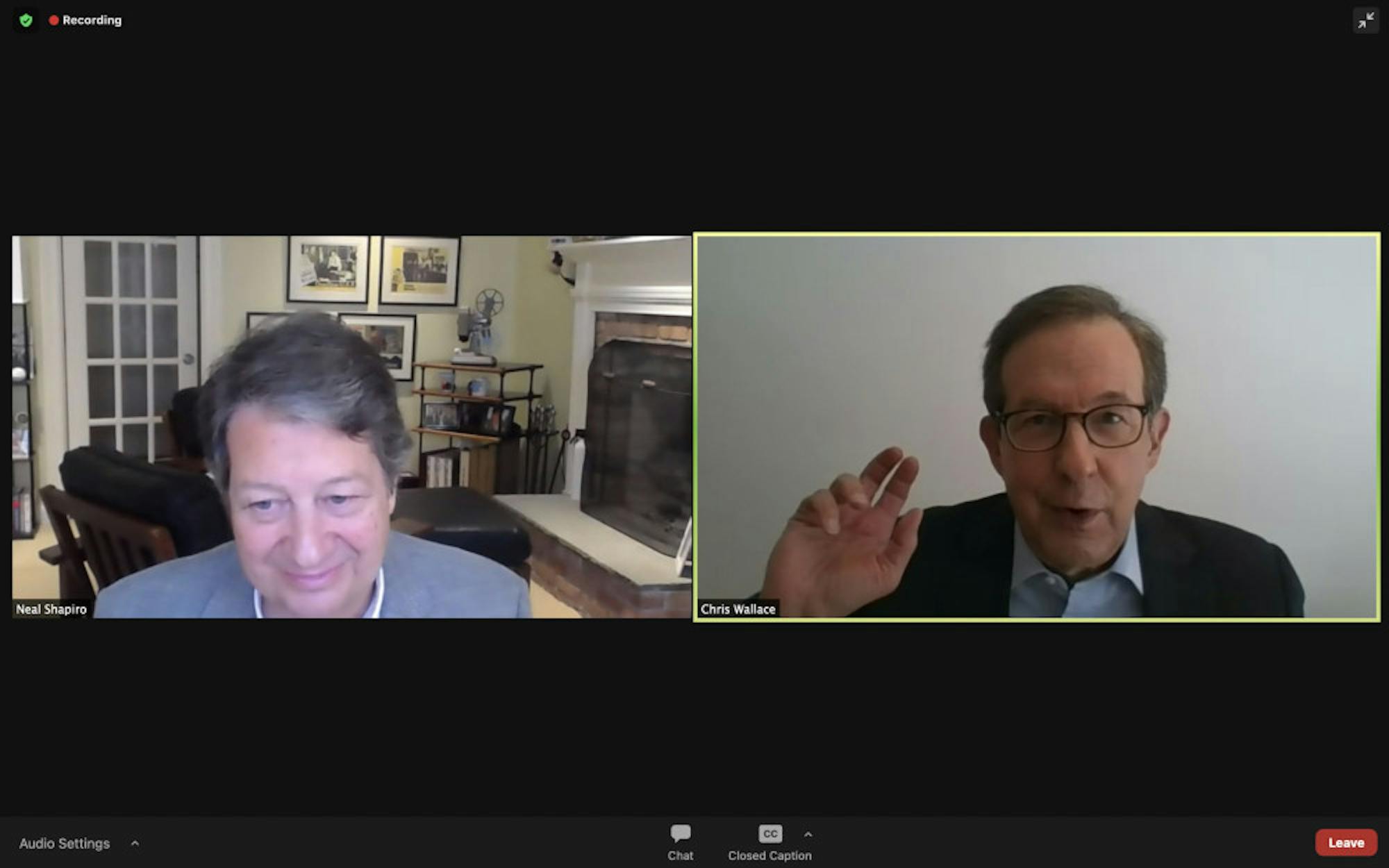Chris Wallace, host of Fox News Sunday, spoke to the Tufts community about issues in journalism in a livestreamed event on Thursday.
The event, “Speaking Up and Speaking Out: Politics, Power, and Freedom of the Press,” was hosted by the Jonathan M. Tisch College of Civic Life. The event was the 14th annual Edward R. Murrow Forum on Issues in Journalism, and the third event in this semester’s Tisch College Distinguished Speaker Series.
Tisch College Dean Alan Solomont delivered opening remarks and introduced Wallace by outlining his experience conducting high-profile interviews, moderating debates and covering national political stories, as well as his beginnings in journalism.
"Wallace began his career in the news business as a teenager, when he worked as an assistant to Walter Cronkite during the 1964 Republican National Convention," Solomont said.
Solomont introduced president and CEO of WNET Neal Shapiro (A’80) to moderate the event.
Shapiro began by asking Wallace about the unique relationship between former President Donald Trump and the press.
Wallace reflected on his interviews with Trump and the criticism that he received from him on Twitter.
“The first time I got a named tweet from Trump, as president, it got my attention because I’d never been attacked in that kind of personal way in a tweet by the president of the United States,” he said. “But pretty quickly … it kind of washes off your back; if it doesn’t, you’re in the wrong business.”
The discussion then turned to the 2020 presidential debate between Trump and President Joe Biden that Wallace moderated in September. Wallace explained his approach to moderating the debate, and the differences between conducting an interview and moderating a debate.
“A debate is not an interview, and one of the things that I'm very conscious of … is that it’s not about you, it’s about the two of them,” he said. “My feeling about debates and moderating was that it is a little bit like being the referee in a championship prize fight. At the end of the fight, people say that was a hell of a fight … then you’ve done a great job as a moderator."
Wallace turned the conversation to the riots at the U.S Capitol on Jan. 6 and described his initial reaction to the riots and media coverage of the event.
“That was one of the more extraordinary live events I’ve ever covered,” he said. “I was aware, in fact I asked it in the presidential debate, about right-wing extremism, [but] was I conscious or sensitive to the fact that it was as big, as virulent and as mobilized as it turned out to be on Jan. 6? No."
Shapiro then asked Wallace about the growing number of journalists articulating their points of view while covering stories. In response, Wallace explained the different roles of straight news and opinion, and how he believes the two should remain separate.
“I distinguish between news and opinion,” he said. “I actually think Fox does a reasonably good job in distinguishing between the two.”
He added that he hopes Fox News viewers understand the difference between news and opinion.
"I hope people distinguish between what Tucker Carlson and Sean Hannity do and what I'm doing," Wallace said. "What concerns me more is when [opinion] seeps into or floods into what I consider what should be basic news coverage."
Wallace also explained how important it is that the media report fact-based, unbiased coverage of stories, especially amid the threat of fake news.
“I’m very opposed to what Donald Trump did in trying to delegitimize the media,” he said. “In February 2017, when he put out that tweet that said the fake news media, and then he put in parentheses CBS, ABC, NBC, Washington Post, New York Times are the enemy of the people, I was horrified by that.”
However, Wallace said he felt that Trump's actions and attacks gave his colleagues in the straight news media the feeling that they could push back and share their opinions, which Wallace disagrees with.
“I think that was a mistake that we felt that [Trump's] attacks on the media allowed the straight news media to attack back and be advocates back,” he said. "My reaction was 'No, we've got to play it straight and we've got to stay in our lane.'"
He spoke again on the growing biases of news media outlets, and the way that influences viewers' opinions.
"The most successful business model now is to take a side," Wallace said. He acknowledged that Fox News partakes in this, but said the trend across news outlets was "terribly sad."
"People want to watch or read the outlet, the news media platform, that agrees with them and that gives weight to what they already believe," Wallace said.






